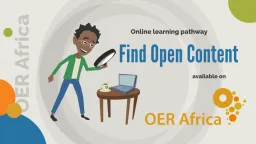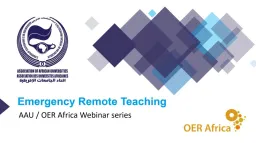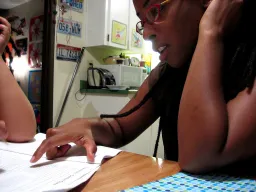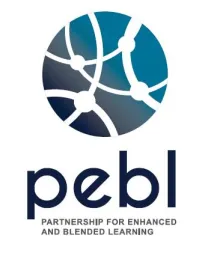Explore the dynamic world of Open Educational Resources and discover how OER Africa is driving the movement forward. This page is divided into two sections:
Articles: Our articles aim to deliver insights on OER-related themes that inform, spark conversation, and engage with the developing open education landscape, with a particular focus on Africa.
Updates: Below, the articles, you'll find updates on OER Africa’s latest initiatives, activities, and contributions to the OER community.
Articles
This section features targeted articles crafted specifically for educators, students, and the global Open Educational Resources (OER) community. The articles examine themes related to OER, offering insightful perspectives and information. The content seeks to inform, prompt discussion, and actively engage with the dynamic landscape of open education, particularly within the African context.

Following adoption of the UNESCO Open Educational Resources (OER) Recommmendation, UNESCO launched the Dynamic Coalition for the OER Recommendation on 2 March 2020

While many educators appreciate the value of openly licensed content, the issue is how to find these resources. OER Africa has prepared an interactive, multimedia rich, learning pathway on just this topic. It identifies a suggested simple set of procedures to find open resources that align with your curriculum requirements.

Trying to work out how to best teach your students during university shutdowns due to the COVID-19 crisis? Sign up for a webinar series on Emergency Remote Teaching, hosted by the Association of African Universities (AAU) and OER Africa. Register here.

World Book and Copyright Day on 23 April is a celebration to promote the enjoyment of books and reading. Now that so many of us are at home with our children because of COVID-19, we can explore the virtual world of children’s stories – all free to read and many openly licensed. Some wonderful book and reading resources are listed below.

This week, OER Africa shares some resources we consider useful for institutions in the midst of current restrictions of movement and the requirements to introduce remote teaching in many countries due to the COVID-19 pandemic. We have selected resources for universities, school management teams, mathematics, reading and writing, as well as our most popular downloads over the past six months.

As the COVID-19 pandemic has spread, millions of learners and educational institutions globally have had to make rapid, unforeseen changes to how they run their learning programmes. Face-to-face teaching and learning have become impossible in many countries and there is uncertainty over when educational institutions will reopen their doors. This may have long-term effects on school programmes, examinations, and most importantly, learning.
Updates
This section provides updates on OER Africa’s initiatives and activities. Stay informed about our contributions to the OER community and how we are driving the open education movement forward.

The Association of African Universities (AAU), in collaboration with Saide, invite all suitably qualified persons to respond to this call for the pilot course entitled: 'Continuous Professional Development course for University Leaders.'

Since 2018, OER Africa has partnered with the Partnership for Enhanced and Blended Learning (PEBL) Project, a collaborative project to develop blended learning courses with university partners across East and West Africa. PEBL is using our platform to showcase the courses as OER.

Saide and OER Africa would like to extend their deepest condolences to Professor Tolly Mbwette’s family and friends. Professor Mbwette was the former Vice Chancellor of the Open University of Tanzania.

We hope that you are doing well and staying safe as South Africa and many other Sub-Saharan African countries adapt to closure of schools and other educational institutions in response to the COVID-19 pandemic.
As people practise social distancing and implement new routines at home, OER Africa would like to reiterate its support for African educators and students to harness the power of open content.

The COVID-19 pandemic has affected 363 million learners worldwide (UNESCO, 2020). The Commonwealth of Learning's (COL’s) experience shows that open, distance and online learning, if done well, can have the same outcomes as campus education without requiring teachers and learners to be in the same place at the same time. COL has compiled a selection of resources and tools as a first response to this crisis.
